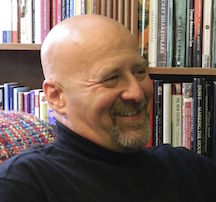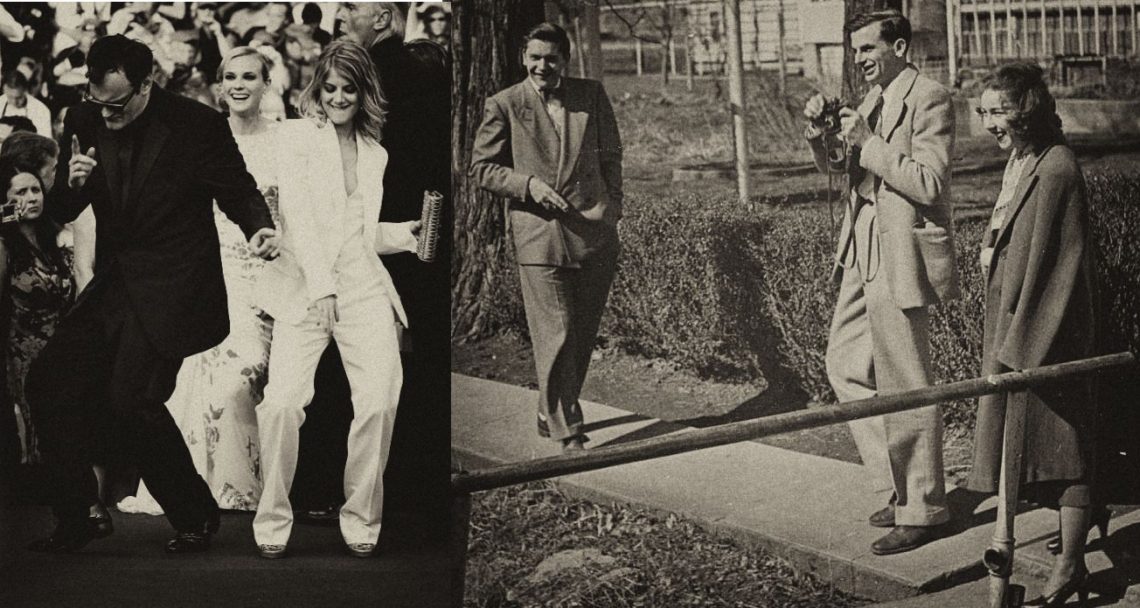by Dwight Longenecker
EDITOR’S NOTE: This year marks the 25th anniversary of the release of Quentin Tarantino’s Pulp Fiction. Though the film is rightfully recognized as a landmark in 20th-century American cinema, readers of Veritas Journal would be well-advised to heed the author’s note and the film’s MPAA rating before viewing.
Pulp Fiction is the violent, witty, crazy, disjointed film that made Quentin Tarantino’s reputation. A story from deep within the underbelly of Los Angeles’ crime scene, at first the film seems to glorify gangsters, exalt addiction, and magnify mindless murder. Vincent and Jules are the hired killers for crime boss Marsellus Wallace. Butch is a boxer who Marsellus instructs to throw a fight to cheat the bookies. Pumpkin and Honey Bunny are lowly bank robbers who have their eye on restaurant stick-ups, and Lance and Jody are a scumbag couple of drug pushers.
With a plot line that destroys plot lines, and banal dialogue overlaid with shocking violence, the film has been hailed as an homage to nihilism on the one hand and an illustration of divine Providence on the other.
Those unfamiliar with Pulp Fiction should be warned. It is not for the squeamish and it is certainly not a film for family viewing. Not only is the violence graphic, but also the language and behavior is what you would expect from gangsters. At the depth of the film there is one scene of sexual perversion and violence that takes you into the heart of darkness. When it came out, Pulp Fiction was blasted for indulging our lust for gratuitous gore and gangsters, vice, violence, and innocent victims.
Winning numerous accolades from the international film community, Pulp Fiction has also collected endless comment and analysis from film buffs and aficionados. Most interesting are the philosophers and theologians who have weighed in on the film’s meaning. Philosopher Mark Conrad discusses “Symbolism, Meaning and Nihilism” in the film. Meanwhile, this online reviewer explains “Why Christians Should Love Pulp Fiction.” Both authors dissect the characters, dialogue, and plot of the film, gleaning truths embedded in the story that Mr. Tarantino certainly never intended.
Or did he?
While Pulp Fiction undoubtedly takes us into the cellar of human depravity, I was reminded, after watching it, of Flannery O’Connor’s nightmare world. Who can forget the chilling effect of one’s first reading of A Good Man is Hard to Find when we realize the Misfit is executing the Bailey family members one by one. O’Connor uses the same mix of banality and bloodshed to elevate the horror by cruel contrast. Here is a psychopath and he is my neighbor.
Time and again in O’Connor’s fiction the depravity, foolishness, and violence of humanity is mingled with the mundane. In Wise Blood the insanity of the young preacher Motes is paralleled by the idiocy and absurdity of his “friend” Enoch Emery who steals a mummified dwarf from a museum, then murders a movie promoter in a gorilla suit before stripping naked to don the gorilla suit and terrify people. The fifteen-year-old seductress, Sabbath Lily, plunges the story into a dark cellar of twisted desire and Motes’ own actions of murder, self-blinding, then wrapping himself in barbed wire, complete the nightmare—the whole story propelling the spinster from rural Georgia into the same insane, violent, absurd, and depraved world of Mr. Tarantino’s Los Angeles.
What glimmers of light do we spy in O’Connor’s weird stories? Grace penetrates the fantastic freaks and gothic grotesqueries. Like light filtering through cracks of a dungeon wall, there are moments of enlightenment. The grandmother touches the Misfit tenderly the moment before he shoots her, and in her final moment grim reality finally punctures the facade of her smug self-righteousness. A calm resignation penetrates the story as Motes pursues an ascetic life in recompense for his insane violence. Some power is unleashed in the midst of the horror—a power that could not be at work in the same way without the horror.
Whether Mr. Tarantino intended it or not, the same tremor of redemption and hints of grace reverberate within his terrible film. The gangster Jules believes he was spared from the bullets intended for him by a miracle, and he decides to turn from crime to be what we might recognize as a holy fool—a wandering pilgrim. Butch the boxer saves Marsellus Wallace (the man who was about to kill him) from the depraved rapists, and he himself is spared only by a seeming coincidence from being killed by Vincent Vega. Does the working of grace echo through Pulp Fiction as it does through the work of Flannery O’Connor?
There doesn’t seem to be anything in Mr. Tarantino’s other work or in his own comments on the film to indicate an awareness of theological depth that might underscore the story. And yet there is that curious detail… after Butch escapes the torture chamber and returns to rescue his enemy Marsellus, he rides off into the sunset on a chopper motorcycle with the word “Grace” emblazoned on the tank.
Are Pulp Fiction and the work of O’Connor witnesses to the absurdity, violence, and insanity of nihilism, or are they pointers to the prevailing power of Providence? The fractured structure of Mr. Tarantino’s film and the episodic and seemingly disjointed structure of O’Connor’s Wise Blood smell of nihilism: “There is no structure here,” we want to say, “There is no meaning, no overarching narrative. All is random. All is meaningless.”
Yes, but at the end of the film, and at the end of O’Connor’s stories with their famous sting in the tail, the light of Providence glimmers tantalizingly. So there was a meaning after all! But it was not the meaning I was expecting. So there was a plot line and structure after all! But it was not the structure I was expecting.
And isn’t that what life within the adventure of faith is all about? We launch out into the deep. We step out of the boat to walk on the waves. We embark on the great quest not knowing what the future holds, and in the darkest moments we despair of meaning. In the depth of our loss we come to believe that all is indeed pointless and God, if such a being exists at all, is sleeping… or even worse he exists, but he is a cruel God who tortures his creatures for his own pleasure.
Then in the end we see the story from a fresh perspective and see that the storyteller knew what he was doing. He was weaving a different tale—one we could not have imagined ourselves, and that in his version even the most terrible horror was part of the plan. He was there in the darkest dungeon, and he turned even the most absurd terror to his glory.
This article is republished with gracious permission from The Imaginative Conservative (June 2019).
Quentin Tarantino image by Danimartins, Flannery O’Connor image by Cmacauley, both licensed under Creative Commons 3.0 (cropped and colored)

Fr. Dwight Longenecker is Senior Contributor at The Imaginative Conservative. A graduate of Oxford University, he is the Pastor of Our Lady of the Rosary Church, in Greenville, SC, and author of sixteen books including The Romance of Religion, The Quest for the Creed, and Mystery of the Magi: The Quest to Identify the Three Wise Men. He contributes to many magazines, papers, and journals, including National Catholic Register, St Austin Review, Catholic Digest, and Intercollegiate Review. Visit his blog, listen to his podcasts, browse his books, and be in touch at dwightlongenecker.com.





